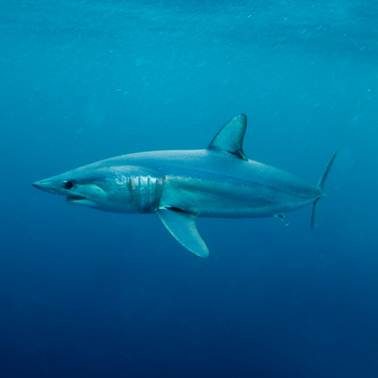Sharks under pressure
Deoxygenating deep-sea drives sharks to the surface and increases vulnerability to longline fishing
Climate-driven ocean deoxygenation renders the ocean’s most wide-ranging shark more vulnerable to fishing
Research carried out by Global Shark Movement Project scientists is the first to test whether expanding oxygen minimum zones (OMZs) in the oceans push sharks closer to the surface, making them more susceptible to capture by fisheries.
Climate-driven changes in the ocean are leading to reduced amounts of dissolved oxygen in seawater, known as ocean deoxygenation. It causes permanent OMZs that exist across the oceans, typically at depths of around 200-800 metres, to expand both horizontally and vertically. Ocean deoxygenation is likely to have important effects on large, high-oxygen demand fish such as pelagic sharks.
The research, published in the journal eLife, studied the effect of the expanding west African OMZ on blue sharks, the ocean’s widest ranging shark. These master-migrators travel thousands of kilometres across entire ocean basins and from the surface down to over 1,600 metres depth.
The authors satellite tagged blue sharks to record maximum dive depths within the OMZ and surrounding areas of the North Atlantic Ocean.
Professor David Sims of the Marine Biological Association and University of Southampton, who co-led the study, said “By satellite tracking the movements and diving behaviour of blue sharks over many months we were able to see them shift into surface waters to avoid deeper, oxygen-deficient waters.”
Alongside this, the scientists used GPS tracking of longline fishing vessels to explore the effect of this shift into surface waters (habitat compression) on catches of blue sharks above OMZs. Dr Marisa Vedor of the Universidade do Porto and Lisboa, the first author of the study, said “We found the west African OMZ to be a longline fishing hotspot with higher catches of blue sharks, most likely driven by habitat compression into surface waters”.
Dr Nuno Queiroz of the Universidade do Porto, who co-led the study, added “The habitat compression of blue sharks makes them potentially easier to catch which could increase catch rates as OMZs continue expanding in the future.”
Blue sharks are highly susceptible to capture by fisheries and are commercially important for their high value fins. They make up ~90% of the total reported catch of pelagic sharks in the Atlantic, and yet this IUCN Near Threatened species has few catch restrictions anywhere in the world. Professor David Sims said, “Our results argue the need for management measures to mitigate the effects of ocean deoxygenation on shark catch rates, which appear substantial above low-oxygen deep waters.
He continues, “Marine protected areas around oxygen minimum zones may be needed to safeguard sharks in the future as oceans continue deoxygenating”.






